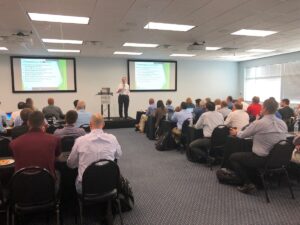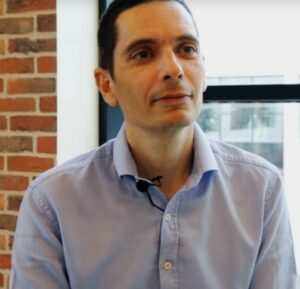Maxime Lecchi, coordinator of the "Ensuring Infrastructure Integrity" program at RICE, has been nominated to the PRCI Research Steering Committee for a 3-year term, starting in March 2021.
Focus on PRCI and its members|Evolving business areasThe
PRCI (Pipeline Research Council International) was founded in 1952 in the United States. An independent, not-for-profit organization since 2000, it is the global benchmark for oil and gas infrastructure research and development.
The organization brings together operators and transport providers: 60% of the global oil and gas industry is represented. The research carried out concerns the integrity of the pipelines: maintaining the qualities of the network over time, protection against corrosion (coating, cathode protection), inspection, analytical criteria and decision support tools (typical defect types)... monitoring, measurements, compression stations and underground storage. Distribution issues, on the other hand, are not addressed.

A highly structured organization
The PRCI is made up of 8 theme-based technical committees (e.g., inspection and integrity, corrosion, materials and construction, operational monitoring, etc.), responsible for conducting research and development studies.
These committees are managed by a board and interact with the
Research Steering Committee(RSC). The RSC is linked to the Executive Board and the Executive Assembly of the PRCI (which includes Sandrine Meunier, Director of RICE). In particular, it ensures that research and development actions are aligned with the medium and long-term objectives of the PRCI.
PRCI members contribute annually in proportion to the network mileage they operate. During the year,
the Strategic Research Priorities (SRP) defined by the Executive Assembly are re-discussed and these topics are automatically raised by a portion of the dues. Each contributor then decides which projects of their choice they want to allocate the remainder of their dues.

|Among the topics studied, energy transition and research on renewable gases are not yet agreed: for example, the sensitivity to these issues of American companies differs with the state from which they originate. RICE has been the driving force behind the development of a roadmap for PRCI on the conversion of the hydrocarbon transmission network to renewables.
However, as each operator is in a quasi-monopolistic situation in terms of infrastructure, few subjects raise a problem of competitive advantage within the PRCI, which facilitates collaboration. The leverage obtained by the presence of 60% of the industry makes it possible to conduct studies that could only be conducted with difficulty by a single member: PRCI improves the state of the art for the entire industry.

RICE's new responsibilities within the organization
Through his new position in the RSC, Maxime Lecchi will be responsible for communicating to technical committees roadmaps and development programmes, conducting annual and multi-year reviews of projects (achievement of objectives, need for additional funding, etc.), ensuring the matching of resources and objectives, reviewing pending projects or unallocated funds and recommending changes in terms of priorities based on interaction between technical committees and "Executive Board.'
As a representative of RICE and GRTGaz at PRCI, Maxime Lecchi will be particularly concerned with seeking a consensus on energy transition projects during RSC proceedings and ensuring that these topics are not overshadowed by others.
Let us wish him success in this new task.||||||

 |Among the topics studied, energy transition and research on renewable gases are not yet agreed: for example, the sensitivity to these issues of American companies differs with the state from which they originate. RICE has been the driving force behind the development of a roadmap for PRCI on the conversion of the hydrocarbon transmission network to renewables.
However, as each operator is in a quasi-monopolistic situation in terms of infrastructure, few subjects raise a problem of competitive advantage within the PRCI, which facilitates collaboration. The leverage obtained by the presence of 60% of the industry makes it possible to conduct studies that could only be conducted with difficulty by a single member: PRCI improves the state of the art for the entire industry.
|Among the topics studied, energy transition and research on renewable gases are not yet agreed: for example, the sensitivity to these issues of American companies differs with the state from which they originate. RICE has been the driving force behind the development of a roadmap for PRCI on the conversion of the hydrocarbon transmission network to renewables.
However, as each operator is in a quasi-monopolistic situation in terms of infrastructure, few subjects raise a problem of competitive advantage within the PRCI, which facilitates collaboration. The leverage obtained by the presence of 60% of the industry makes it possible to conduct studies that could only be conducted with difficulty by a single member: PRCI improves the state of the art for the entire industry.
